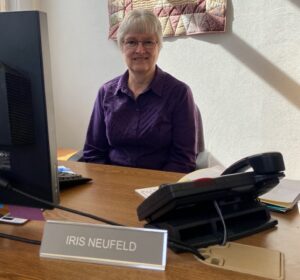Risa Fukaya took a non-conventional route to earn her four-year degree at Bluffton by starting at a two-year liberal arts college and earning her associate degree before getting her bachelor’s degree.
Many Bluffton graduates go for a non-traditional way of completing their bachelor’s degree—coming into school with an associate degree or taking college classes in high school. However, there are different requirements depending on how the student achieved their credit.

Risa Fukaya in the Commons. Photo by Olivia Daugherty.
Fukaya, a senior social work major, attended Hesston (Kansas) College before transferring to Bluffton University. Hesston College is a sister school to Bluffton and one of five colleges and universities associated with Mennonite Church USA.
“I wanted to transfer to another Mennonite college for my bachelor’s degree,” said Fukaya. “Back then I was going to be a speech pathology major, and Bluffton was the only Mennonite school with that major.”
Iris Neufeld, Bluffton’s registrar, works with students to transfer credits to begin the transition to Bluffton.
“Every institution sets their own rules,” said Neufeld. “For Bluffton, we accept credit from any properly accredited institution. That would include community colleges, state colleges, and many private institutions both in Ohio and elsewhere.”
The number of students coming into Bluffton with college credit is growing due to the spread of the state of Ohio’s College Credit Plus program. CCP allows for students to take college-level classes while in high school to transfer to institutions upon graduation.
“Sometimes, students come in thinking they want to graduate early and decide not to,” said Neufeld. “They add a second major, add a minor, or become involved on campus.”

Joseph Earl. Photo by Olivia Daugherty.
Jospeh Earl, a junior communication major, attended Edison State Community College as a CCP student. He chose to take CCP classes to graduate in three years.
“I started CCP my sophomore year of high school,” said Earl. “I thought I would learn more, and I wanted to challenge myself.”

Iris Neufeld in her office. Photo by Olivia Daugherty.
Bluffton has separate guidelines for CCP students and true transfer students. This affects which Bluffton Blueprint classes they must take. All students are required to meet a cross-cultural requirement and to take the Enduring Values Capstone course, previously called Christian Values in a Global Community.
The Bluffton Blueprint includes Becoming a Scholar, Learning in Community, Cross-cultural requirements and Enduring Values Capstone.
“A student who transfers in as a sophomore based on hours has met [the qualifications for] Becoming a Scholar,” said Neufeld. “Someone who transfers in as a junior has met [the qualifications for] Learning in Community.”
CCP students are required to fulfill the Arts and Lecture and Bluffton Blueprint requirements every incoming freshman has, even if they plan to graduate early.
Because Fukaya transferred from a different institution, she is able to attend a reduced number of Arts and Lecture events.
“Even Arts and Lecture credits—everyone else needs 60 but I needed 30,” said Fukaya. “They [the admissions] are really good at being flexible.”
Fukaya is pleased with the path that led her to Bluffton. Her start at Hesston allowed her to travel to different states and explore a nation different than her home, Japan.
“I am very happy,” Fukaya said about her Bluffton experience after she transferred. “I love the personal connections I made with people here.”






